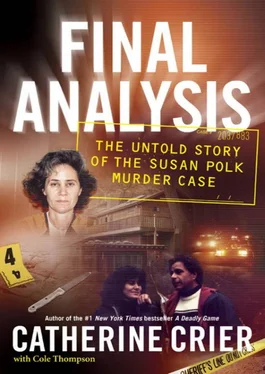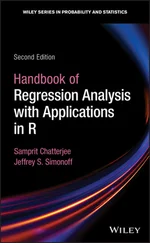Helen found Costa’s theory preposterous. She believed that if Susan had left Felix’s car at the BART station, she had to have had an accomplice—maybe Gabriel—to drive her home. Gabe had been home at the time and recently he had been extremely angry with his father. The teen was so angry that he had taken a sledgehammer to Felix’s Saab that past June, damaging the sporty sedan. Gabe later explained that his mother had provoked the incident, after angrily describing Felix as the “great and powerful destroyer.”
David Bolling was at the house the day a tow truck arrived to transport the Saab to an auto body shop for repair. He asked Gabe about the damage and was surprised by his nephew’s response.
“I never liked the guy,” the teen reportedly said, referring to his father.
While Helen was not one to start accusing her grandchildren, she was hard-pressed to believe that her daughter had masterminded and carried out such a brutal attack alone. The whole murder scenario seemed so out of character for Susan, who had never displayed such violent tendencies. If what police were saying was true, something must have triggered an uncontrollable rage. Or maybe, Helen thought, her daughter had no choice; Susan had to kill Felix or be killed herself.
As Helen spoke to Costa, she began to reveal the complicated relationship between Susan and Felix. She recounted the tumultuous years that followed her divorce from Theodore Bolling and the traumatic impact that the breakup had on Susan. The young girl had watched her once happy, loving mother slowly come apart when her husband left the family. To compound matters, Susan suffered again when her father divorced his second wife, Rita, for a third woman. People close to Theodore recalled a significant change in the youngster, who seemed to view the breakup with Rita as yet another betrayal by her father. Susan had accepted that perhaps Theodore and Helen were simply a mismatch and that Rita was a better fit for him. She even befriended Rita and, according to witness accounts, the two were close.
But news that her father was walking out on his second wife for yet another woman truly upset Susan. She could no longer excuse his inability to honor a commitment. He had rejected both Helen and Susan when he left the marriage in 1964. Now, he was rejecting Rita, as well. From a psychological perspective, all daughters want to believe they are second in line for their father’s affection, but suddenly, it seemed, there were lots of women who came before her.
Around this time Susan began suffering from the paralyzing anxiety that landed her in Felix’s office. Anxiety is often a symptom of buried emotion, and for Susan her father’s second divorce seemed to spark a rage within her. This volatile emotional state and her young age made her extremely susceptible to Felix’s advances. Felix was charismatic and magnetic—compelling to a girl who had long been seeking the approval of an older man. He had mastered the art of concealing his underlying objective: to control everything and everyone around him.
Helen believed this was how Felix lured Susan into his world. It pained her to think that she was partly responsible for failing to report the therapist to the authorities. If only she had gone to police when she first learned of Susan’s inappropriate relationship with Felix, her daughter might not be in jail on charges of murdering him. Instead Helen confronted Felix on her own, in the hope that he would do the right thing.
But Felix never let Susan go, and instead, things only got worse. Helen tried to intervene and take her daughter on a trip to Santa Barbara to meet boys her own age; Susan was not interested. She was completely entranced by Felix, or “glued in,” as Helen put it. The therapist had become a father figure, and this unhealthy relationship distorted Susan’s teenage years. She made few friends in high school and at college. Eventually, Felix was all she had.
Since Susan’s world was so narrow, Helen was not surprised to learn of the impending marriage. She never approved of the union and even called Felix’s first wife to apologize for her daughter’s involvement in the breakup of that relationship. Despite her sixty thousand dollar loan to the newlyweds, Helen soon found herself all but banned from their home.
When Helen finished telling Detective Costa her version of the Polk saga, she fell silent. She had provided a myriad of details that clarified some of the history behind Susan and Felix’s marriage, but her role in the case was only beginning. After hanging up the phone, she headed for her beat-up blue sedan as she prepared to make the drive to Orinda.
Chapter Fifteen
INCITING EVENTS
On Thursday, October 17, a day after Helen spoke to Detective Costa, Susan sat quietly in the holding cell of the Martinez jail, waiting for officers to escort her to the Walnut Creek Courthouse where she would be formally charged with Felix’s murder. She barely looked up when a uniformed guard unlocked the cell door and admitted a conservatively dressed man.
“I am Dr. Paul Berg,” the man smiled, extending a hand to Susan.
Dr. Berg had been sent to the jail by Contra Costa County prosecutors to form an opinion of Susan’s mental state before the scheduled 2 PM arraignment. At first Susan was compliant, listening intently as the Oakland psychologist explained the psychological evaluation. Even when he informed her that their conversation would not be confidential and his findings would be used in court, Susan agreed to cooperate. “However, she very quickly changed her mind, asking a number of relevant questions, before declining to speak further,” Dr. Berg reported without revealing her concerns.
Obviously, Susan had a firm grasp on the magnitude of her situation. Emerging from the room, the psychologist advised Detective Costa that Susan halted the interview. Still, Dr. Berg said he was able to form an opinion on the suspect. He believed Susan was “sane” and asked “appropriate questions” for a “person in her position”—a person under arrest for murder.
In a confidential letter to Assistant District Attorney (ADA) Tom O’Connor four days later, Dr. Berg reiterated his findings, writing “my observations…were that she was calm, composed, mildly withdrawn, and quite serious-minded. She did not show any obvious signs of mental disturbance, particularly none of any loss of contact with reality or other signs of a Thought Disorder.”
That afternoon, Susan was brought before a judge as scheduled. Handcuffs encircled her thin wrists as she was led to the defendant’s table flanked by armed court officers. She possessed an air of elegance, even when wearing the prison-issue gray sweatshirt and baggy blue slacks. Her short hair was neatly combed and a touch of lipstick defined her lips.
Susan’s voice was barely audible as she stood before Contra Costa County Superior Court Judge Bruce Mills and announced her need for a public defender. There was a sudden interruption from a well-dressed man standing in the gallery.
“Your honor,” the man addressed the judge.
Recognizing the voice immediately, Susan broke into sobs. It was her father, Theodore Bolling. He had come to court to request an adjournment. He had retained a prominent San Francisco attorney, William Osterhoudt, to defend his daughter and wanted the case postponed until the new lawyer could be present in court. Susan stood speechless, tears rolling down her cheeks, as her father addressed the court. Judge Mills agreed to adjourn the case until 1:30 the following afternoon.
Rising to his feet, the prosecutor in the case, ADA Tom O’Connor asked the judge to raise Susan’s bail from the standard $1,050,000 for murder defendants to upwards of $5 million.
Читать дальше











